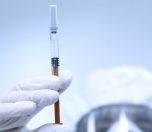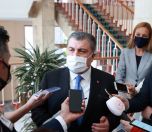TTB warns against Delta variant: 'It might have serious consequences'
.jpg)
* Image: Pixabay
Click to read the article in Turkish
According to the World Health Organization (WHO), the Delta variant is now becoming the dominant COVID-19 variant in the world.
While there are officially 134 Delta cases diagnosed in Turkey so far, the Turkish Medical Association (TTB) Central Council has released a written statement about the issue and warned: "Considering the new variants, especially the Delta variant, we warn the authorities that creating a perception of 'outbreak is over' might have very serious consequences."
It has noted that "there are still COVID-19 mutations in both Turkey and other countries," saying, "We are faced with concerning variants."
Referring to the attitude of Health Ministry regarding the measures taken in foreign travels, the TTB has criticized this attitude for being "unsuited to the intercountry risks." According to the TTB, when the people who come from countries such as the United Kingdom (UK) and Russia, where the Delta variant is becoming more and more widespread, have a negative PCR test carried out in the last 72 hours, it is considered to be enough.
However, in order for our country to not face a new danger, scientific measures must be stepped up, especially in foreign travels.
What the TBB has recommended within this context is a practice applied to travellers from countries such as India, Nepal and Pakistan.
The people arriving in Turkey from these countries are expected to have a PCR test conducted in the last 72 hours; if the test is negative, they are quarantined for 14 days. They have the right to travel in Turkey if the test turns out to be negative at the end of this 14-day period.
Accordingly, the TTB has recommended that the Ministry should introduce the same conditions for the travellers from the countries with high incidence of the Delta variant, such as the UK and Russia.
Third dose with a mRNA vaccine
The Turkish Medical Association (TTB) has also underlined that "considering the risk posed by the Delta variant, healthcare workers and the ones aged 65 and over should be vaccinated with the third dose of a mRNA vaccine, which has proven effective against the variants."
Calling on the Ministry of Health to scientifically consider vaccinating the population aged 12 and over, the TTB has said that vaccine stations and mobile vaccination vehicles should be used, when necessary.
Warning once again against the perception of "the outbreak is over", the Association has emphasized, "The responsibility of the government is not to impose its own ways of live and anti-democratic practices on people, but to take the necessary measures against the outbreak."
Welcoming the high daily numbers of vaccination in the country, the TTB has underlined that Turkey is still far from social immunity.
134 officially confirmed cases in Turkey
Minister of Health Fahrettin Koca has recently announced that the Delta variant has been diagnosed in 134 people in Turkey.
However, when the variant's rate of spread and the difficulty in diagnosing it are considered, the real number of cases is unknown.
As reported by the BBC, the Delta variant is thought to be 40 to 60 percent more transmissible than other variants. Andrea Ammon, the Director of the European Centre for Disease Prevention and Control (ECDC), said on June 23, "Preliminary data shows that it can also infect individuals that have received only one dose of the currently available vaccines".
The Delta shows different symptoms than COVID-19. "The number one symptom is a headache, then comes sore throat, nasal flow and fever.
Experts want that more "traditional" COVID-19 symptoms like cough and loss of the sense of smell are now rarer; young people are now reporting symptoms of cold and "a funny feeling" more. (PT/SD)












